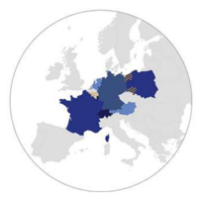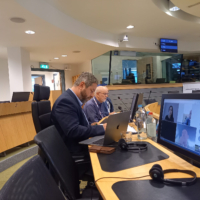A new tool for cross-border governance is being designed by OECD
Governance + Planning | 21 June 2024
Governance + Planning | 21 June 2024
One and a half year ago the European Commission assigned the Organisation of Economic Cooperation and Development (OECD) to develop a tool for cross-border governance. The draft tool is ready and it was presented in and commented on at a conference and workshop held in Brussels on 18 and 19 June.
In order to improve the quality, the grounding and sustainability (resilience) of cross-border governance, the Commission invited the OECD to elaborate a comprehensive tool including the governance, strategic planning, funding and political representation aspects thereof. After the draft proposal had been delivered, the experts of the OECD convened practitioners of the five PILOT regions involved in the project and further experts to discuss the document.
After the greetings, the four aspects mentioned above were presented through practical examples of the PILOT areas and other organisations. The first panel was dedicated to cross-border spatial planning where Oliver Ginès spoke about the difficulties to cross-border planning at the Spanish-Portuguese border, Nathan Ball gave an overview on the frames of planning at the France-Luxembourg border area and Gyula Ocskay presented the principles of CESCI’s cohesion-based planning methodology and particular examples of their application.
The second panel targeted cross-border public services where Xavier Conill, general director of the cross-border Cerdanya Hospital listed the achievements and the difficulties concerning the establishment and the operation of the institution, Sabine Zillmer summarised the lessons of the ESPON CPS project.
The participants of the third panel (Loïc Delhuvenne from the Lille-Kortrijk-Tournai EGTC, Ingrida Leckevičiené on behalf of the Niemen-Niemunas EGTC and Romina Kocina representing the EGTC GO) treated the funding and financing aspects of cross-border governance. The difference between the older and the new EGTCs was salient in this respect. The EGTC GO is also a good example for the diversification of financial resources.
On the second day of the conference, the first panellists concentrated on the attraction and maintenance of political and societal support for cross-border structures. Marie Azambre (Pôle Métropolitain du Nord Lorrain) highlighted the significance of multi-level political support through which they can improve the quality of cross-border public transport, childcare services and to establish a cross-border development fund. Cathrine Christiaens and Léa Duhem, project coordinators of the Lille-Kortrijk-Tournai EGTC presented innovative ways of communication with the population and the decision-makers of the region. Jean Peyrony, director general of the MOT justified the added value of multi-level governance through the example of the COVID pandemic.
The final session was about commenting on the proposal in four small groups where the participants were invited to share their critical and supporting remarks based on which the draft tool can be developed further and delivered by the end of this year.

 The future of Interreg and the cross-border movement of ambulance cars on the...
The future of Interreg and the cross-border movement of ambulance cars on the...